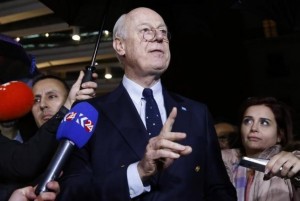
The United Nations Syria envoy Staffan de Mistura is very keen to hold a new round of peace talks after big powers agreed on a “cessation of hostilities”, a U.N. spokesman said on Friday, but plans to reconvene the negotiations were still “cloudy”.
De Mistura abruptly suspended a first round of talks on Feb. 3, saying there was more work to be done by the big powers sponsoring the talks between the Syrian sides, but he hoped to bring them back to the table in Geneva by Feb. 25.
The big powers, led by U.S. Secretary of State John Kerry and Russian Foreign Minister Sergey Lavrov, struck a deal in Munich early on Friday to start to bring an end to hostilities in a week and to provide rapid humanitarian access to a handful of besieged Syrian towns as a first step.
Diplomats from the countries sponsoring the Syria talks held a first weekly humanitarian meeting in Geneva on Friday and demanded besieged areas are opened up to aid within days.
“We have already submitted requests for access to the parties surrounding besieged areas,” said Jan Egeland, who chaired the meeting. “We expect to get such access without delay. Finally, the civilians who have been deprived of their basic right of humanitarian access for so long, will have hope.”
Egeland earlier said he hoped the Munich agreement could be “the breakthrough we have been waiting for”, but it needed all countries to use their influence with the warring sides.
De Mistura will brief the U.N. Security Council on Feb. 17, U.N. spokesman Ahmad Fawzi said. But it was unclear whether the Munich deal was enough for him to reconvene the peace talks.
“You’re asking for certainty in a very cloudy situation. Politics is the art of the possible,” Fawzi told a U.N. briefing.
Aid agency chiefs said the humanitarian deal covered only the tip of the iceberg, with U.N. figures showing 486,700 people under siege among 4.6 million who are hard to reach with aid, plus 5 million refugees and millions more homeless within Syria.
“In the short-term, ceasefire or not, we need unconditional, rapid and regular access to all affected areas across the country to help millions of people,” said Robert Mardini, regional head of operations at the International Committee of the Red Cross.
David Miliband, head of the International Rescue Committee, said the agreement needed detail and urgency.
“You don’t wait a week for an emergency operation and the people of Syria should not have to wait a week for relief from bombings,” Miliband, a former British foreign secretary, said in a statement.
“We wait with eager anticipation to see whether this agreement is a turning point or a false dawn.”
(Reporting by Tom Miles, additional reporting by Stephanie Nebehay; Editing by Robin Pomeroy and Andrew Heavens)

